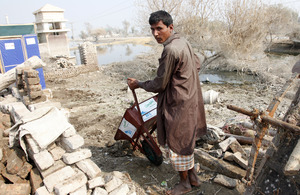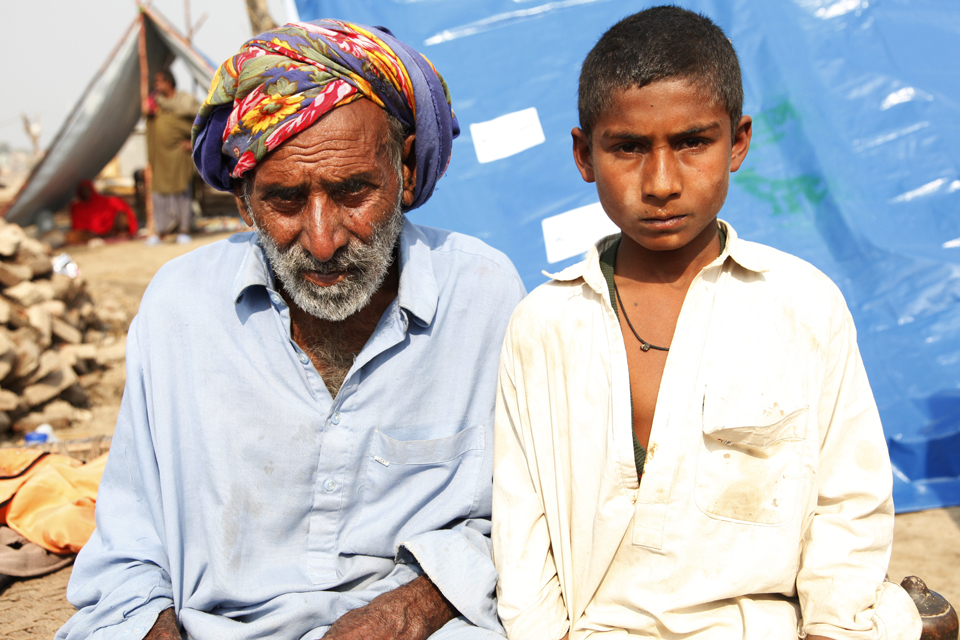Pakistan floods six months on: a roof over their heads
UK aid helps to provide shelter, hygiene kits and safe water to communities in Dadu, Sindh province

Clearing rubble in Sindh province, Pakistan. Picture: Russell Watkins/DFID
When the water came
Ten-year-old Waseem and his family were forced to leave their home during the extreme flooding in July and August 2010.
Some of his relatives are still living in a nearby camp but half of his family have recently returned to their village.
Funding from the UK government is helping thousands of flood survivors like Waseem move back to their communities by providing them with shelter materials, clean drinking water, latrines and hygiene kits.
Waseem still remembers the night that the disaster struck his community, washing away buildings, belongings and food which had been stored for the year ahead.
“Water was everywhere. Our homes and rice crop were totally destroyed and we had no grain or food left,” he says. “We had nothing and were totally helpless.”
“Eventually a tractor with a trailer rescued us and took us to a camp. But there were no tents, so we had to sleep in the open. It was really hard.”
Rebuilding homes, rebuilding lives
With UKaid funding, the charity Concern Worldwide has provided Waseem’s family with tents and plastic sheeting for shelter, and tools and wheelbarrows to help them clear mud from the remains of their home.
Concern Worldwide are also installing new hand-pumps, which will provide essential clean drinking water for the village.
Waseem’s grandfather, and head of the household, 70-year-old Long Khan explains how important the aid has been: “The shelter we’ve been given has helped to protect us from the sun and to fight the mosquitoes at night,” he says. “All my family lives in it.”

Waseem and his grandfather in front of a temporary shelter made from heavy-duty plastic sheeting. Picture: Russell Watkins/DFID
“We use the shovel to dig earth and debris from our site and the wheelbarrow to remove it. We use the handsaw to cut bamboos to fix our shelter.”
The family has also received sleeping mats, washing bowls, utensils, tools and personal hygiene kits.
Back to school
Before the floods, Waseem used to go to school. But all his books and pens got washed away when the water swept through his village.
“All my books are gone. The school is gone. Everything is gone,” he says.
“I want to go to school, but I don’t have a pencil or a pen. Without these, I can only learn by heart. I want to be a doctor or a teacher. I also like the army very much.”
Over the coming months, the UK government will be helping 200,000 children like Waseem get back to school by funding the repair of 1,500 school buildings and providing 200 temporary learning facilities across Punjab and Sindh.
There is a long way to go for Waseem and his family as they rebuild their home and their lives, but this essential humanitarian aid is supporting them as they return to their village and begin the process of recovery.
Facts and stats
UK aid support to Concern Worldwide will address the emergency shelter, household and water and sanitation needs of 90,600 flood affected households (634,200 beneficiaries) in Sindh province. This will include shelter and non food items to 49,600 families.
Materials, toolkits and cash-for-work schemes will provide shelter to 4,000 families. Strengthening people’s homes will protect families from future flooding.
An emergency shelter kit for one family includes two plastic sheets, rope, bamboo poles and a toolkit.
A ‘winterization’ kit which provides protection from the cold weather includes two blankets, two local-style mattresses and one floor mat. Hygiene kits include soap, combs, toothpaste, toothbrushes and towels.